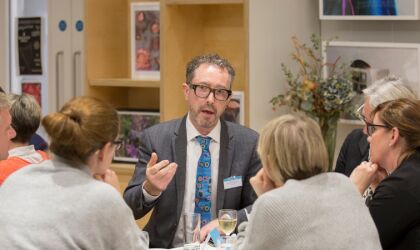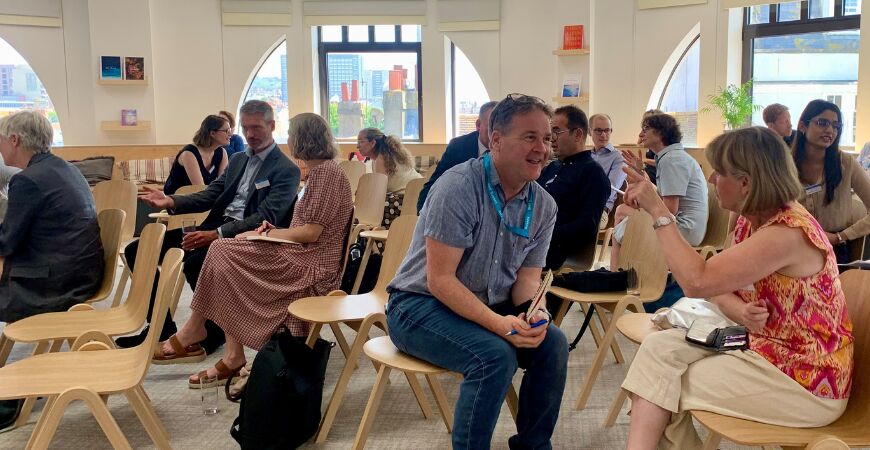

Fri 14 / 07 / 23
Social impact and what to do with it
Plus Accounting are supporting Brighton Chamber‘s Thought Leadership series and the third of this series took place on Friday 7 July at Projects, Nile Street. Richard Freeman, Founder of always possible, who work with responsible businesses spoke about social impact – what it is, and what to do with it.
By Vicky King of Plus Accounting, Chartered Accountants
The term Social Impact is being discussed around many leadership tables, but what does it really mean, and what should we be doing to really have a social impact as a business?
Richard emphasised the importance of defining, measuring, and communicating social impact effectively. Here are some of our key takeaways, and questions raised during the event:
How can social and economic impact be better measured?
Measuring the social and economic impact of initiatives has become increasingly important in the quest for meaningful change. To truly understand and evaluate the effects of these initiatives, it is essential to develop effective measurement methods that go beyond simple metrics. By delving deeper into the intricacies of social and economic impact, businesses can gain valuable insights and make informed decisions.
How can creativity solve more problems?
Creativity is a powerful tool that can unlock new perspectives, generate fresh ideas, and ultimately solve complex problems. By fostering a culture of creativity and encouraging innovative thinking, businesses can tap into a vast array of possibilities to address social and economic challenges more effectively.
Can you collaborate better?
Collaboration plays a vital role in addressing complex issues. Exploring ways to enhance collaboration can result in more impactful outcomes.
What workforce do you need?
Understanding the skills, expertise, and diversity required within a workforce can contribute to achieving social impact goals effectively.
What makes a thriving business? Who are you, and how can your impact be amplified?
Identifying the characteristics of a thriving business and recognising the potential for amplifying impact can lead to sustainable growth and positive change.
‘Thrive is an energy - there is an extra dynamic behind it, a considered growth’.
Thriving businesses exhibit a unique energy and a purposeful approach to growth, considering the impact they create. Striking the right balance between growth and its impact on the socio-economic environment is crucial for sustainable development.
Trust is key for collaboration.
Trust is a fundamental element that underpins successful collaborations in any context, including those aimed at achieving meaningful social impact. It serves as the glue that holds together individuals, businesses, and communities, enabling them to work together towards shared goals and objectives.
When stakeholders have confidence in each other's intentions and actions, they are more willing to collaborate and share resources, knowledge, and expertise. Trust cultivates an environment where ideas can flourish, barriers can be overcome, and collective efforts can be harnessed to drive positive change.
Social impact accreditations - does that help with trust? How do you prove that the badge is valued?
Social impact accreditations can contribute to building trust. Demonstrating the value and integration of these accreditations within business practices strengthens their credibility.
Define it. Measure it. Communicate it.
This mantra emphasises the importance of clearly defining social impact, measuring it effectively, and then effectively communicating the results.
What does impact mean to you?
Impact can be understood in various ways. It can encompass factors such as better staff motivation, improved balance sheets, and enhanced reputation.
CSR (Corporate Social Responsibility)
CSR involves taking responsibility for the impact a company has on various stakeholders, including employees, customers, communities, and the environment. It recognises that businesses have a broader role to play beyond profit-making, and they can contribute positively to society by actively engaging in activities that promote sustainable development and social progress.
ESG (Environmental, Social, and Governance)
ESG has become mainstream and is increasingly being incorporated into businesses' balance sheets. It focuses on a company's environmental, social, and governance performance.
BCorp
BCorps are businesses that meet high standards of social and environmental performance, accountability, and transparency. They sit between ESG and Social Enterprise, offering a framework for purpose-led for-profit businesses.
For profit but purpose-led - is this positive enough?
The discussion explores whether being purpose-led while operating for-profit is sufficient to create positive social impact.
Use the label that works for you - what change do you want to make?
The suggestion is to choose a label or framework that aligns with the desired change a business seeks to create.
This event highlighted the importance of defining, measuring, and communicating social impact effectively, as well as considering various frameworks and approaches to purpose-led business practices.
At Plus Accounting we are continuously looking at how we can empower our clients to take control of their finances, how we can enable our team with the skills and confidence to ask the right questions and work with our surrounding business community. All of these elements play a part in how we have a positive social impact – however we are looking at ways that this can be further improved and this event really allowed us to take a step back and ask the question ‘so what?’.
Plus Accounting are sponsoring our Thought Leadership series – events for the thoughtful business leader to learn and connect with like-minded people. Find out more about Plus Accounting here.
For this and more learning events from Brighton Chamber, head to our events calendar.
If you want to contribute to the Chamber blog, contact us on hannah@brightonchamber.co.uk



